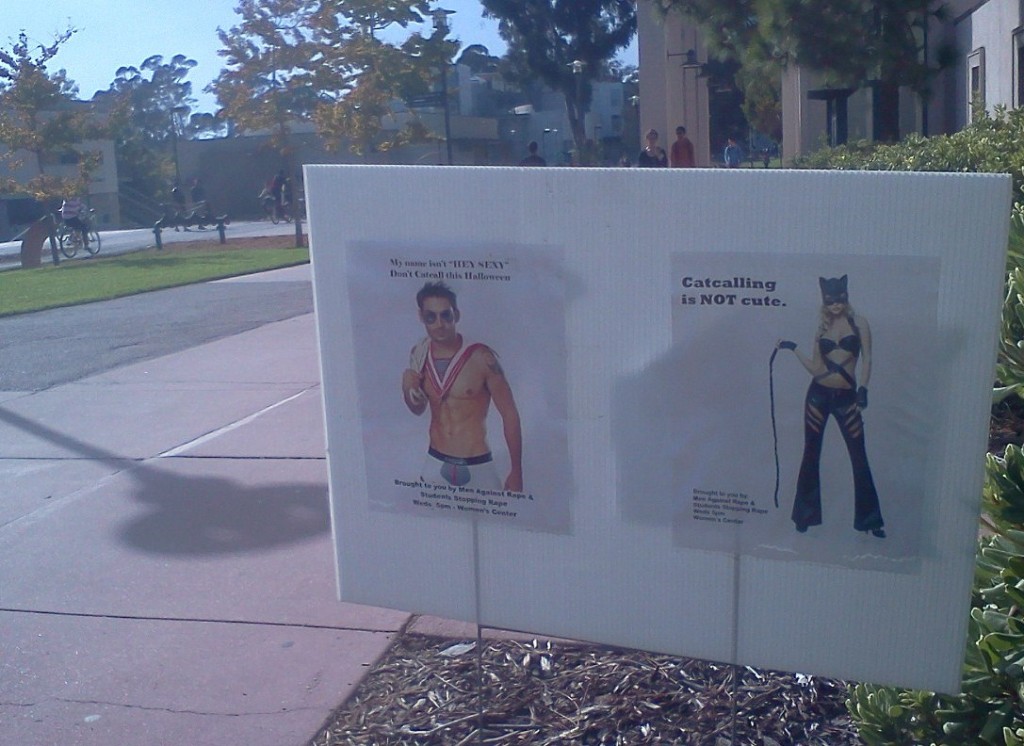Editor’s Note: Halloween in Isla Vista, the college town where UC Santa Barbara is located, is a huge party every year. Unfortunately, some people use this as an excuse to street harass and assault people. So this year, two student groups teamed up to organize a campaign against street harassment.
Students Stopping Rape and Men Against Rape teamed up together to start a conversation within our campus community; our topic was street harassment in our college town of Isla Vista (IV), specifically during Halloween. Our motivation began as we discussed IV culture and how often times street harassment is shrugged off as typical Isla Vista behavior. We all agreed there was something seriously wrong with that, and in spite of how often it happens, people should not make others feel sexually objectified, unsafe, and humiliated.
We set out to question our culture and prepared a campaign that showed students that sexual harassment is socially unacceptable. In our attempt to challenge our community, we decided to create a flyer campaign surrounding the Halloween season. The campaign used a simple design by putting an image of one or more women in costumes and short quotes such as “Catcalling is not cute,” “Sexual assault is a crime,” and “Consent is super.”
Our campaign focused on different aspects of sexual violence, but our flyers about street harassment and catcalling caught the most attention, as well as some criticism by the student population. Some people think that catcalling is not serious, adopting a sticks-and-stones mentality. We wanted to address more than one form of violence and show people that street harassment is sexual violence and part of rape culture. We are glad that our campus took notice and that the campaign began a conversation about an issue that is often unaddressed.
We believe that this is an important issue to address because this objectification only serves as a precursor to sexual assault, such as rape. To be clear, catcalling does not cause rape, and not everyone who harasses another person is likely to commit sexual assaults. However, research shows that the small percentages of men who do commit sexual assaults believe that all men act the way they do and hold the same attitudes towards women. When men who do not rape participate in harassment behaviors, the few men who do rape are validated in their beliefs. By creating this mentality culture of individuals being equated to only sexual objects, the likelihood of rape is greatly increased because of this dehumanization. Catcalling allows the severity and consequences of such terrible acts like rape, sexual assault, and lack of consent, to be lessened in the public eye.
This was our first campaign and we hope that we can continue to spark conversations and be proactive in challenging unsafe social norms and ultimately changing them. Our goal is to educate our campus community in effect changing mentalities and culture surrounding sexual violence.
This guest post was co-written by Liliana Salazar, a fourth year student at UCSB and coordinator for the Students Stopping Rape organization. While majoring in Sociology and Psychology she also works at the Women’s Center and the UCSB library.
It was also co-written by RJ Thomsen, a fourth year student at UCSB majoring in Sociology and Feminist Studies and coordinator for Men Against Rape. While not working in the Women’s Center this student is an active leader in UCSB’s queer community.

